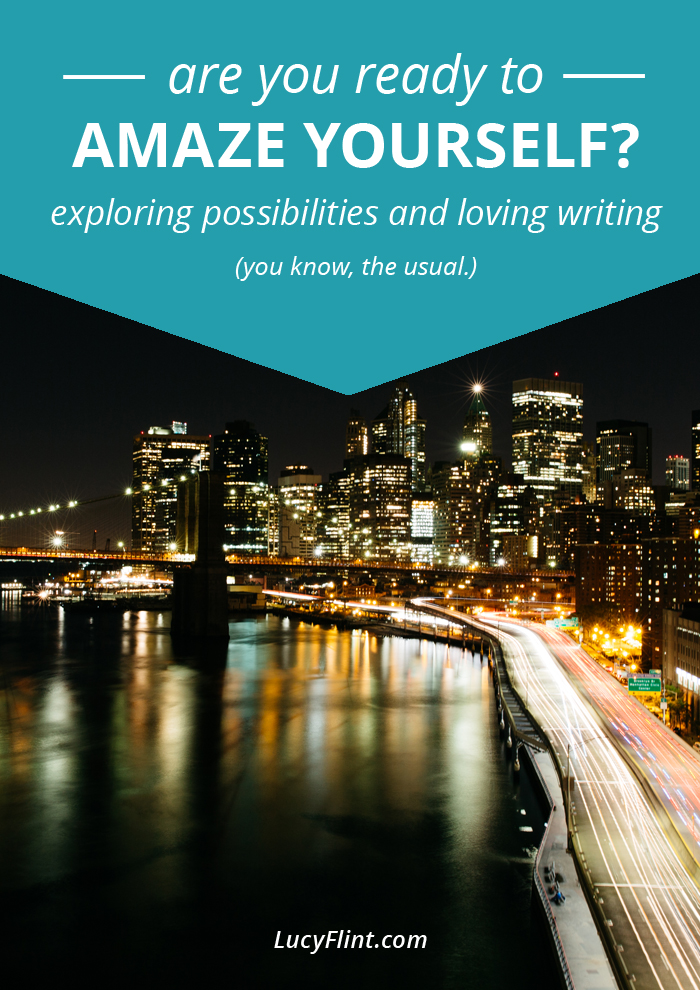Are You Ready To Amaze Yourself? (Exploring Possibilities and Loving Writing. ... You Know. The Usual.)
/These three prompts are gonna knock us out of any little ruts we've been in.
Instead, we'll practice being writers who see dazzling possibilities in the information we read, the places we go, and the projects we dream up.
It's going to be a lovely ride...
Get your goggles on and let's get started!
February 22: Be a sleuth.
I know, I know. I've already gone on record about my massive love affair with the reference section, and how it's like taking superpower pills for my imagination.
But it is so freaking worth it to make this a regular part of our writing lives!
So just go with me on this.
TODAY'S CHALLENGE: Pick up a reference book you don't normally grab.
Maybe something medical, or a botany index. A random chunk of the encyclopedia, or one of the incredible hyper-specific volumes in the reference section of your local library.
Flip through it for fifteen minutes. And just write down everything that delights you.
This isn't RESEARCH. This isn't looking for FACTS.
This is about being exposed to and charmed by words and phrases and sentences that you aren't around all the time.
This is about wandering around, wearing your imagination's heart on your sleeve, and falling hard for the strangest and loveliest bits of information you come across.
Go ahead. Let yourself geek out a bit.
(My latest delight? I just found out about the tradition of night climbing in Cambridge. Those photographs!! Swoon!)
February 23: Be a spy.
TODAY'S CHALLENGE: Go somewhere where you don't normally think of writing, exactly. Someplace that isn't overtly literary...
But bring the writing life with you.
Maybe you're sitting at the bar of a restaurant and watching the chefs zip around the kitchen.
Or maybe you're in a concert hall, an art museum, a church service, or a graveyard.
Wherever calls you most: Go.
And while you're there, imagine you're a literary spy.
You're an emissary, a representative of the writing life.
Study everything, like you've just fallen into a novel. Like you could spin a story out of this moment, this place.
Bring a blank notebook and jot down phrases, notes on the atmosphere, or even just a single word that seems to sum it all up. Catch the juiciest bits of dialogue you overhear.
You don't have to write much. It can be just a few notes and scribblings... or it can be a huge, lyrical, epic poem.
But try to enter that place of having a writer's eyes in a "non-writing" place.
And just see what happens.
February 24: Be extravagant.
TODAY'S CHALLENGE: Start a dozen little projects today. Writing projects.
You and your writing life. Put your heads together, and dream.
Yes, really.
Yes, even if you already have plenty of unused ideas floating around. (What's a few more, lionheart?)
These new ideas don't have to be more than one sentence, or even one word.
Invent a series of books together. Maybe it's four novels, or sixteen quick chapter books for kids, or an epic saga cycle of five huge fantasy books.
Maybe it's a whole detective series based on the amazing bits of info you picked up on Monday, and the place you visited yesterday.
If this makes you feel crazy, just shake it off. Have a light touch. No sweat. This isn't "for real." You're not committed to any of this. It's just for fun.
This is like talking about the dream plans for a future house, or places you want to travel, or all the kids you want to have.
This is just about entertaining possibilities.
So lean into it.
Suggest titles. Dream up the most off-the-wall protagonist ever.
Write a sentence or five for each of the ideas.
Or, just come up with a huge list of pretend character names.
Or invent the cities and empires that will rise and fall at your command. Make maps.
Goof off together. Try to come up with bigger concepts, the more impossible the better.
Dream huge dreams, you and your writing life, together.
Give each other the moon, the world, a whole solar system.
Dazzle yourself with the possibilities.
Isn't this dangerous? Nah. You can come back down to earth later, and have a renewed appreciation for the sweetness of your current work-in-progress. It's a wonderful thing after all.
... Or, wait. Yes. Yes, it is dangerous, incredibly so. We're playing with ideas, after all. It might as well be dynamite.
You might be laying the imaginative tracks that you will sail down in a year or two, on your way to becoming one of the most inventive writers of your generation.
You daring lionheart, you!
We're coming down to the end of the month! Can you believe it??
Come back on Thursday for your last batch of writing life prompts...
And in the meantime, happy dreaming!














